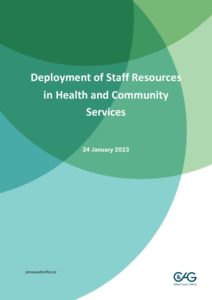
Tuesday 24 January 2023 - Report
Tuesday 24 January 2023 - Report
Topics: Value for Money
Departments: Health & Community Services
Sector: Health & Social Care

Report: pdf (597.31 KB)
Download in full ↓The health and care system in Jersey is going through unprecedented demand pressure and change due to factors including an ageing population. The outdated healthcare estate is an additional challenge to providing efficient and effective healthcare. Two major programmes of work have sought to address these challenges, the new Care Model and the ‘Our Hospital’ project.
The Department of Health and Community Service’s (HCS’s) clinical and non-clinical management teams need to work closely with the frontline workforce to ensure that staff resources are deployed effectively and efficiently and in such a manner as to support delivery of the new care model principles and enable the effective use of the new hospital.
At 31 December 2021, 2,475 staff were employed within HCS, up from 2,371 as at 31 December 2020. This represents over 30% of the entire workforce of the Government of Jersey. The HCS workforce included 208 doctors, 713 midwives and nurses and 392 healthcare assistants.
Like all HCS staff, medical staff are crucial to the delivery of the changes required to achieve the new care model. More than ever during this period of change, clinical staff (including medical consultants) and staff in management positions have a joint responsibility to work closely together to provide the best possible healthcare within the resources available to them.
Job Plans are part of a consultant’s contract of employment. They are an annual agreement that set out duties, responsibilities and objectives for the coming year. Effective consultant job planning is a key mechanism through which senior managers and consultants can agree, monitor and deliver effective services to patients and service users.
The review has evaluated:
The review has considered arrangements within HCS and not the wider health and social care system on the Island. The review has also not considered deployment of staff resources in contracted off-Island providers of healthcare.
The review has encompassed all specialities across HCS.
As part of the review I have followed up on previous recommendations made by my predecessor in her 2017 report Private Patient Income: Health and Social Services Department Follow Up where the recommendations are relevant to workforce planning and management.
The Health and Community Services Department is under significant pressure currently. Factors that are contributing to this pressure include:
In order to deliver and implement an effective and comprehensive workforce strategy, issues that need to be addressed include:

Associate Member of EURORAI - a cooperation project between public sector supervisory bodies in Europe